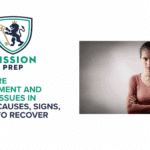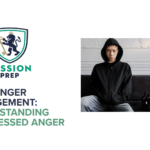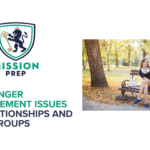If you’re a parent of a teenager, you’ve probably found yourself walking on eggshells sometimes, wondering “Why is my teen always so angry?” One minute they’re laughing at a message on their phone, the next minute they’re slamming doors, shouting, swearing, or giving you the silent treatment.
It’s confusing and tiring, and if we’re being honest, it’s sometimes a bit scary too. Adolescent anger isn’t necessarily a phase they’re going through. If their anger is starting to affect school, relationships with people, or their mental health, it’s a signal that they need more support.
You might feel alone and unsure of what you can do to help your teen. Don’t worry, we’re going to give you ten tips to help you support your teen without making them shut down or worsening the situation. We’ll also look at why teens can get so angry, and how professional support can give teens the help they need.
You may not be able to take away your teen’s anger, but you can be their safe person as they learn how to manage their emotions during these turbulent years.
Why Is My Teen So Angry All the Time?
You might already know this, but teen aggression is partly caused by their biology. It’s a time when their bodies are flooded with hormones that affect their mood, and their brains are still developing. You know the part of the brain that adults have that is responsible for things like decision-making and impulse control? Well, that’s still not fully formed in teenagers, which is why they can be prone to outbursts that seem to come from nowhere.1 Sometimes, their anger can come from other factors such as conflict with their parents or siblings, problems at home, pressure from school, or low self-esteem.
However, anger can also be a sign that there may be deeper issues at play, possibly a mental health challenge such as anxiety or depression. That’s why it’s good to know when anger stops being ‘normal’ and starts becoming a problem.
Signs of Anger Issues in Teenagers
While teenage anger can be a natural part of puberty, there are some signs to look for that indicate there may be an anger issue:2
- Extreme changes from their usual mood
- Isolating or withdrawing themselves
- Unable to function day-to-day
- Bullying other people or getting into fights
- Causing damage to property or breaking objects
- Harming animals
- Talking about hurting themselves or other people
- Talking about suicide
- Shouting or swearing at others
If you notice these signs, it’s best to check in with your doctor and seek professional help for your teenager.
If you’ve read this far and are wondering how to help a teen with anger issues, we’ve got ten tips coming up for ways you can support them. Keep reading to find out more.
10 Ways to Support Your Teen With Anger Issues

1. Be Gentle
Speak to your teenager gently and respectfully. You need to try to stay calm because you are modeling the behavior that you want them to learn. Don’t meet their anger with your own, and avoid shouting, calling them names, or accusing them of anything.2
2. Pay Attention
If you and your teen are talking, give them your full attention. It will show them that you are listening, that you care, and that you are interested in what they are saying. Ask questions and try to understand what they’re going through.3
3. Validate Their Feelings
This can be a tricky one, as you might not agree with their behavior. However, anger itself is a normal emotion that everyone feels at some point, so you can let them know that they have the right to be angry. After all, it’s ok to be angry.4 Try to understand what they are feeling – we were all teenagers at some point. If you show that you can understand their struggle, you’re opening up the path to more communication and for them to feel safe enough to open up to you if there is anything wrong.
4. Be Approachable
Try to stay calm and approachable with your teen so that if they do have something on their mind, they feel comfortable coming to you to talk about it. And when they do come to you to talk, remember that you don’t need to try to fix anything for them. Your role will be to listen, to put yourself in their shoes, and to be there for them.
5. Teach Them Coping Mechanisms
You can help your teenager to identify what seems to trigger their anger, especially if you’ve been listening to them and can put together a pattern that they may not be aware of. Talk with them – don’t lecture them – about what might be happening, and ask questions. Think of healthy ways to cope that you use, and share them. For example, maybe you use deep breathing to help you calm down in the moment, exercise to run off adrenaline, or just take yourself out of the situation when you feel angry and need time to calm down. Your teen might not know how to manage their anger, so give them some ideas.
6. Model Healthy Coping Mechanisms
It’s one thing to talk the talk, but you also have to walk the walk. It’s not enough to just tell your teen how to manage their anger, you need to be able to show them as well. When you get angry, make sure you are using healthy coping skills too. Go for a walk to clear your head, or leave the room to take a few deep breaths before coming back. Be a role model for how to manage anger for your child with anger issues.2
7. Set Boundaries
Boundaries are important in life, whether it’s at home, work, or somewhere else. Let your teen know what behavior you expect of them and the consequences if they don’t abide by the rules. It might feel tricky, but as your teen is becoming more independent it could be a good thing to talk about, and maybe lay down some new rules which you can agree on together. The important thing is to stick to the consequences. Rules don’t mean so much if there aren’t any consequences for breaking them.2
8. Let Them Calm Down
If your teen is angry and storms off to their room to be alone, let them have some time and space to calm down and process what’s happened.5 If they find that being alone and listening to music for a while helps to bring them to a calmer state of mind, they might have found a coping strategy that works for them. We all need a bit of space every now and again, even teenagers.
9. Remember the Good Things
Sometimes, it’s easy to become focused on the problem behavior and forget about the good behavior. Find ways to spend time together, remembering and doing things which you both enjoy and don’t make either of you angry. It can help you to keep perspective when things do reach a boiling point with anger again.
10. Seek Professional Support
If you recognized some of the signs we went through earlier, your teen might have an anger issue. And sometimes, no matter what we do to try to help, it just doesn’t work. You may want to seek out professional help from a service that works with anger issues in adolescence. In particular, cognitive behavioral therapy (CBT) can be effective at teaching teens coping skills for controlling their anger.6
Teen Anger Management Treatment at Mission Prep
Here at Mission Prep, we offer completely personalized treatment plans to help your teen with their anger management. Our popular residential programs allow your teen to be in a structured and supportive environment while they heal. They have access to therapists, peer group sessions, family therapy, and anger management classes to help them learn more about themselves, their anger, and how to cope with it in healthy ways.
A key part of our approach is to help teens understand the triggers for their anger, and support them in creating long-lasting strategies to help regulate their emotions and manage their anger effectively.
Getting Support for Teen Anger Issues

If you’re worried about your teen’s anger, you don’t have to deal with it alone – that’s why we are here to help you.
Our residential anger management programs can provide the structured environment, support, and education that your teen needs, so that they can find their calmer self again. Using approaches such as cognitive behavioral therapy (CBT) and dialectical behavior therapy (DBT), we can help teens to learn the tools they need to regulate their emotions and express their anger in healthier, safer ways.
If you want to find out more about our treatment programs, resources, and services, call our compassionate team at (866) 649-1223, or contact us online by clicking here. Let us help your teen on their road to recovery.
References
- Jacobson, R. (2025, February 5). Teens and anger. Child Mind Institute. https://childmind.org/article/teens-and-anger/
- University of Utah Health. (2025, March 7). Your guide to coping with an angry teenager. https://healthcare.utah.edu/healthfeed/2025/03/your-guide-coping-angry-teenager
- Centers for Disease Control and Prevention. (2024, April 18). Tips for coaching teens to recognize and manage emotions. Essentials for Parenting Teens. https://www.cdc.gov/parenting-teens/tips-coaching-emotions/index.html
- USA TODAY. (2024, August 19). Teen mental health improving, CDC reports. But the kids are far from all right. https://eu.usatoday.com/story/news/health/2024/08/14/cdc-teen-mental-health/74703891007/
- YoungMinds. (n.d.). Anger | Parents guide to support. https://www.youngminds.org.uk/parent/parents-a-z-mental-health-guide/anger/#Supportingyourchildoryoungpersontomanageangerpositively
- National Institute of Mental Health. (n.d.). Disruptive mood dysregulation disorder: The basics. https://www.nimh.nih.gov/health/publications/disruptive-mood-dysregulation-disorder





















